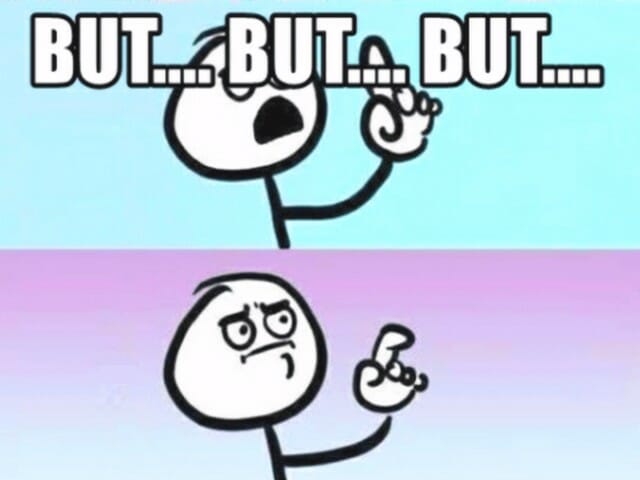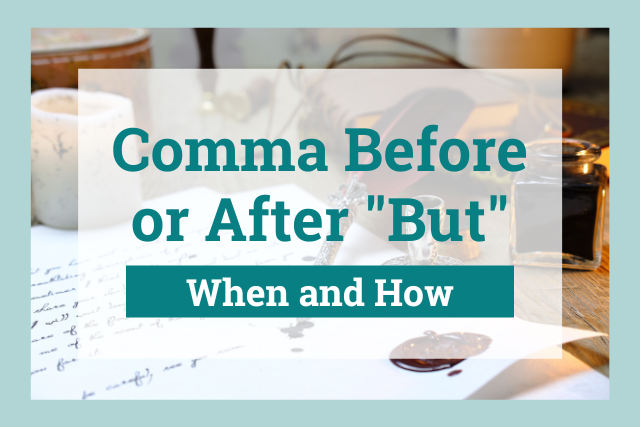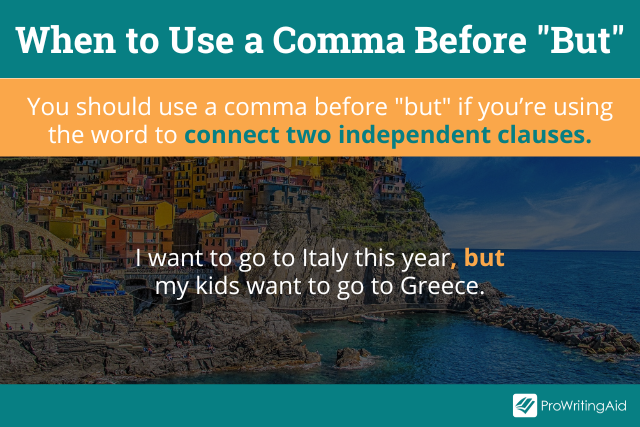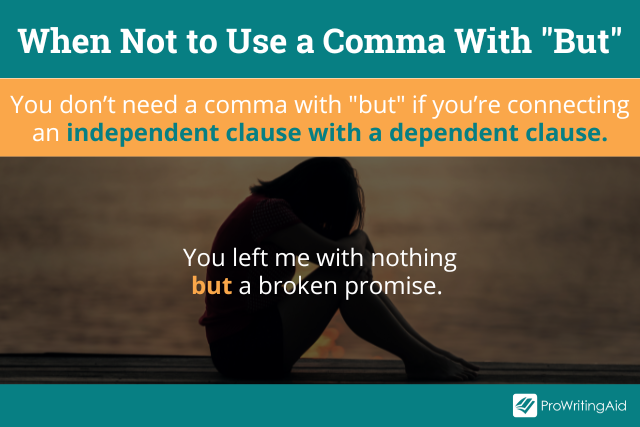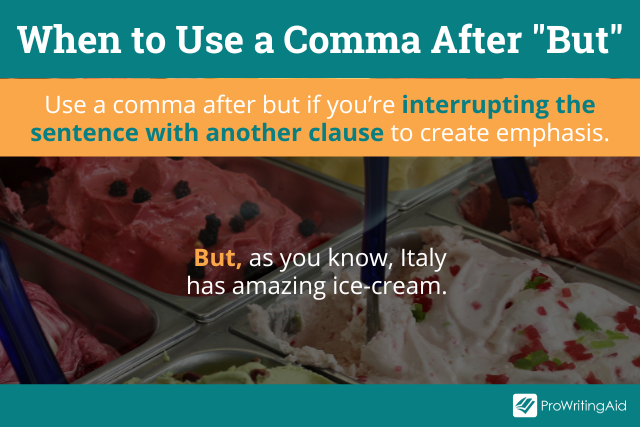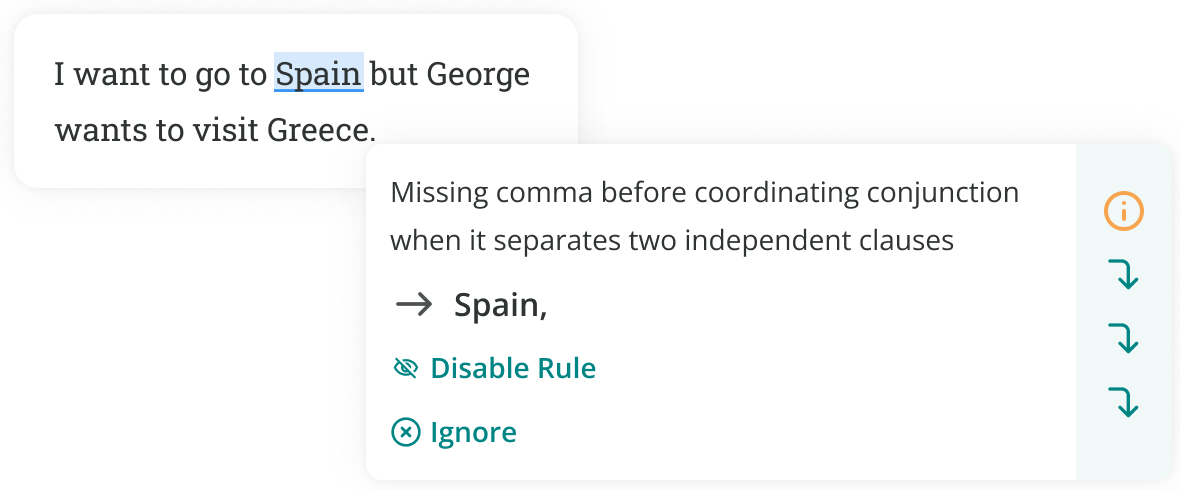If the clause after «but» has a subject and a verb, you need a comma before but. If the clause introduced by «but» does not have a subject in front of the second verb, the comma is often optional.
If the clause after «but» has a subject and a verb, you need a comma before but.
My sister loves cake, but she wants to avoid gaining weight.
My sister loves cake but she wants to avoid gaining weight.
If the clause introduced by «but» does not have a subject in front of the second verb, the comma is often optional. But you can use it to show more contrast or indicate a pause.
I love shopping but don’t have any money.
I love shopping, but don’t have any money.
Contents
- 1. Use a Comma to Introduce an Independent Clause
- 2. The Comma is Optional When Introducing a Dependent Clause
- 3. Other Rules for Placing a Comma Before ‘But’
- 3.1 Use a comma if the clause does not limit or define
- 3.2 Add commas to set off expressions that interrupts the sentence flow
- 3.3 Insert a comma before ‘but’ to separate contrasting parts of a sentence
- 4. More Examples
- 5. Conclusion
- 6. References
1. Use a Comma to Introduce an Independent Clause
As a coordinating conjunction, but joins two clauses of a sentence. If the second clause can stand alone (it has a subject and a verb and forms a complete sentence), add a comma before but.
My brother loves watching TV, but he doesn’t like reading.
My brother loves watching TV but he doesn’t like reading.
Notice that both clauses on either side of the comma can stand alone.
Follow the same rules when using a comma before «and», «or», and other coordinating conjunctions such as «so», «for», «nor», or «yet».
My brother is an artist, and he loves painting.
My brother is an artist and he loves painting.
2. The Comma is Optional When Introducing a Dependent Clause
In some sentences, you don’t need to repeat the subject after but because it is the same in both clauses.
I understand Spanish but cannot speak it.
In the example above, «cannot speak it» is not an independent clause—it cannot stand alone. An independent clause needs a subject and a verb. In this situation, the comma before «but» is optional.
I understand Spanish, but cannot speak it.
Some writers minimize punctuation usage, while others prefer to use more commas to give readers a chance to pause and take a breath.
The classic Blue Book of Grammar and Punctuation argues that using a comma is generally unnecessary when the subject does not appear in front of the second verb.
❝ If the subject does not appear in front of the second verb, a comma is generally unnecessary. Example: Morty thought quickly but still did not answer correctly.❞
Kaufman, Lester; Straus, Jane. The Blue Book of Grammar and Punctuation.
Other authors, however, recommend using a comma if the conjunction is but:
❝ When the subject is the same for both clauses and is expressed only once, a comma is useful if the connective is but. When the connective is and, the comma should be omitted if the relation between the two statements is close or immediate. ❞
Strunk JR., William; White, E.B. The Elements of Style.
As a general rule, you can choose whether to include a comma before but after considering a range of factors, including clarity, emphasis, and rhythm. In any case, add a comma if it makes the sentence clearer.
3. Other Rules for Placing a Comma Before ‘But’
3.1 Use a comma if the clause does not limit or define
Insert a comma before «but» if the second clause does not limit or define; it merely adds something.(1)
For example:
It is not very common, but certainly possible.
By saying «it is not very common», you are already implying that it is possible. Therefore, the phrase «certainly possible» does not limit or define. It just adds information to the main part of the sentence.
3.2 Add commas to set off expressions that interrupts the sentence flow
Use commas to set off expressions that interrupts the flow of a sentence.(1)
I want to go, but not this year, to Italy.
I want to go but not this year to Italy.
3.3 Insert a comma before ‘but’ to separate contrasting parts of a sentence(1)
For example:
The money is in your wallet, but it’s not yours.
4. More Examples
The second clause of these sentences are independent clauses; therefore, we place a comma before but:
- I tried to become a famous singer, but my father ruined it.
- It will be a painful process, but she has no other choice.
- I know it is expensive, but you have a lot of money.
- Yes, I know that you are tired, but you’re not finished.
- It sounds really interesting, but I have decided that I must decline your offer.
- John learns fast, but his attention span is very short.
These are some examples where the comma before but is optional:
- Yes, I have a lot of money, but not for your crazy ideas.
- They are working slowly but surely.
- I bought the car but can’t drive.
- Yes, I know that I am distracted, but cannot take my eyes off that girl when she’s talking.
- The food was good but not delicious.
- I would buy the red one but is too expensive.
5. Conclusion
Follow these guidelines to decide whether to use a comma before but:
- Include a comma before «but» to introduce an independent clause.
- If the subject does not appear in front of the second verb, the comma before «but» is optional.
6. References
(1) Kaufman, Lester; Straus, Jane. The Blue Book of Grammar and Punctuation. Chapter 2 (punctuation).
(2) Strunk JR., William; White, E.B. The Elements of Style.
Английская пунктуация — очень интересная вещь. Здесь мы рассмотрим не совсем очевидный вопрос: ставить ли запятую перед словом «but» в английском языке или нет?
Запятая перед «but»
Ответ на вопрос, на этот вопрос не так прост, потому что в английском языке может быть… и так, и так!
Вообще, английская пунктуация — это бесконечная область споров и дискуссий, поэтому здесь, для ясности, я приведу две общие ситуации, когда нужно ставить и когда нужно пропустить запятую перед but в английских предложениях.
Когда ставим запятую перед but?
Если связка «but» соединяет два полных предложения (independent clauses), то ставится запятая.
Например:
- I like singing, but I don’t like dancing. (Я люблю петь, но не люблю танцевать).
В целом, можно разделить наши способности на два отдельных предложения: I like singing. I like dancing.
Если мы можем так сделать, тогда мы ставим запятую перед but.
- I am happy to discuss it, but first I need to go to the toilet. (Я бы с удовольствием поговорил об этом, но сначала мне нужно сходить в туалет).
Именно так будут выглядеть многие классические английские предложения.
Особенно на онлайн-курсе английского языка Speakingo, где я намеренно часто использую слово «but» , чтобы отработать сложные предложения.
Так что не забывайте ставить запятую в диктанте Speakingo! [Да, да — новая функциональность курса скоро появится!]
Когда мы не ставим запятую перед «but» ?
Давайте рассмотрим другую ситуацию:
- He is handsome, but he is not very smart. (Он красив, но не очень умен).
У нас есть два предложения, запятая перед but. Все чисто.
Просто предложение немного… длинноватое.
То, что вы обычно слышите в реальном английском разговоре, выглядит примерно так:
- He is handsome but not very smart. (Он красив, но не слишком умен).
Обратите внимание, что запятая перед but исчезла.
Почему?
Фраза «не очень умный» не может функционировать как самостоятельное предложение. С потерей «he is» фраза потеряла свою независимость….. и запятую!
или
- The dog is young, but he’s well trained.(Собака молодая, но хорошо поддается дрессировке. — перед «but» ставится запятая )
- The dog is young but well trained. (Собака молодая, но хорошо обученная. — нет запятой перед but)
Стоит помнить, что аналогичная ситуация будет и в случае других английских связующих словах, таких как: and, or или so.
И ставим ли мы запятую после but?
Мы обычно не ставим запятую после but.
Единственным исключением будет, если появятся какие-то «прерывающие» (interrupter) , например :
- But, of course, it’s a great idea to learn English!
(Но, конечно, это отличная идея — учить английский!).
С чем я могу только согласиться!
Поэтому
Запишись на онлайн-курс английского языка Speakingo!
…и без всяких «но»!
Вы уже поняли, нужно ли ставить запятую перед «but» или нет? Если что-то осталось неясным, спрашивайте в комментариях!
СКАЧАТЬ ПРИЛОЖЕНИЕ ДЛЯ ИЗУЧЕНИЯ АНГЛИЙСКОГО ЯЗЫКА НА ТЕЛЕФОН БЕСПЛАТНО:
Присоединяйся
Зарегистрируйтесь, чтобы получить первую неделю обучения бесплатно!
или
Классный текст? Поделитесь этим постом на:


-
Английские фразы -
Методы эффективного обучения -
Английский онлайн -
Английский для бизнеса -
Понимание на слух -
Английский юмор -
Гайд-парк -
Уголок эмигранта -
Мотивация к изучению -
Yчительская -
Экзамены и сертификаты -
Английская грамматика -
Уровень новичка (A1-A2) -
Промежуточный (B1-B2) -
Расширенный уровень (C1-C2) -
Гостевые записи -
Слова и идиомы -
Переводы песен
Найти в блоге::
РЕКЛАМА:
Нажимая на рекламу, вы помогаете мне создавать ценные тексты для моего блога.
сегодняшние записи дня:
Когда-то давно я знал, что значит «A long time ago…»
Ago — это такое короткое, смешное слово, которое означает более или менее то же самое, что и наше «давно». Откройте для себя популярные английские фразы с ago, а также узнайте в каких временах мы можем их использовать. И в чем разница между ago, before, for и since?
Читать далее »
Английский поезд
Поезд по-английски, но какой? Пассажирский поезд, грузовой поезд, международный поезд или, может быть, сексуальный? А как будет купе на английском? Обо всем этом в этой праздничной записи. Также будет несколько полезных фраз и практических советов для туристов, планирующих посмотреть Англию на поезде.
Читать далее »
Последние тексты:
СКАЧАТЬ ПРИЛОЖЕНИЕ ДЛЯ ИЗУЧЕНИЯ АНГЛИЙСКОГО ЯЗЫКА НА ТЕЛЕФОН БЕСПЛАТНО:
Давайте перейдем к обучению
Нажмите ниже, чтобы практиковать говорить по-английски на Speakingo онлайн конечно!
достаточно теории?
Нужна практика?
Изучение английской грамматики — особенно на Speakingo блоге, конечно! — Это может быть даже просто и приятно, но самое главное – это всегда практика!
Поэтому я приглашаю вас на сам курс английского языка, где вся эта грамматика и словарный запас, описанные в блоге, включены в интересные предложения, которые вы говорите на свой телефон или компьютер, как с лучшим учителем, который понимает вас, хвалит или улучшает — и никогда не теряет терпения!
Нажмите ниже, чтобы попробовать этот метод английского языка бесплатно без каких-либо обязательств!
Добавить комментарий
Download Article
Download Article
When it comes to commas, are you supposed to put one before or after “but”? We know how tricky comma placement can seem, which is why we’re here to help! In this article, we’ll teach you when to use a comma before “but” and when to put one after. With our lessons, tips, and examples, you’ll be placing commas like a pro in no time.
Things You Should Know
- Use a comma before “but” in a compound sentence to separate 2 independent clauses.
- Place a comma after “but” if an interrupting phrase or word (such as «of course» or «in fact») follows it.
- Use a comma before any coordinating conjunction—remember them with the acronym FANBOYS (for, and, nor, but, or, yet, so).
-
1
Place a comma in front of “but” if a sentence has 2 independent clauses. An independent clause expresses a complete thought and can stand alone as a sentence because it includes a subject and verb.[1]
Take a look at your sentence, and underline the phrases before and after the “but.” Can these phrases be read as separate complete sentences? If so, use a comma before the “but.”-
Correct: Jacob saw the movie, but his friend read the book.[2]
- Incorrect: Jacob saw the movie but his friend read the book.
- “Jacob saw the movie” and “his friend read the book” make sense by themselves, meaning they are independent clauses.
- Combining a comma and “but” creates a compound sentence, also known as a sentence with two independent clauses.[3]
-
Correct: Jacob saw the movie, but his friend read the book.[2]
-
2
Don’t use a comma if a sentence has a dependent clause. A dependent clause is an incomplete thought as it lacks a subject and/or verb.[4]
Break your sentence into two parts: the phrase before the “but” and the phrase after the “but.” If both phrases can’t be sentences on their own, then they are dependent clauses and a comma isn’t needed.- Correct: The puppy is small but potty trained.
- Incorrect: The puppy is small, but potty trained.
- Although “The puppy is small” could be a separate sentence, “potty trained” is a dependent clause because it doesn’t have a subject.
Advertisement
-
Use a comma after “but” if an interrupter follows it. An interrupter is a word or phrase that appears in the middle of an independent clause (such as “of course,” “on the other hand,” “in fact,” and “however.”). This word or phrase could be omitted from the sentence but is used for emphasis.[5]
In this case, a comma is used after the “but” and final word in the interrupting phrase to signify that the clause is separate from the rest of the sentence.- Correct: But, of course, I wanted to go to the party with Edith.
- In this example, “of course” is the interrupter, as the sentence can also be read as “But I wanted to go to the party with Edith.”
- Correct: I want to go to Germany, but, on the other hand, I’d miss you terribly.
- In this instance, a comma is before and after “but” because the sentence has 2 independent clauses and “on the other hand” is an interrupter.
- If a sentence doesn’t have an interrupter, don’t put a comma after the “but,” as that would make the sentence grammatically incorrect.
-
A comma is used before “but” because it’s a coordinating conjunction. Coordinating conjunctions are the glue that holds your sentence together. In other words, they’re words that join words, phrases, and clauses into one sentence.[6]
These words can be remembered with the acronym FANBOYS, which stands for for, and, nor, but, or, yet, so. A comma is always placed in front of these words in a compound sentence that has 2 independent clauses.[7]
-
For: She bought an apple, for she wanted a snack.[8]
- And: Nikki lives in Florida, and she goes to Disney World every weekend.
- Nor: Will doesn’t like broccoli, nor does he like eating Brussels sprouts.
- But: The lesson was hard, but we all managed to pass the test.
- Or: We can order pizza, or we can go out to eat.
- Yet: The movie has good reviews, yet my friends and I didn’t like the movie.
- So: I broke my foot over the weekend, so I can’t take the stairs.
-
For: She bought an apple, for she wanted a snack.[8]
Advertisement
Ask a Question
200 characters left
Include your email address to get a message when this question is answered.
Submit
Advertisement
References
About This Article
Thanks to all authors for creating a page that has been read 2,009 times.
Did this article help you?
Get all the best how-tos!
Sign up for wikiHow’s weekly email newsletter
Subscribe
You’re all set!
I was once told by an English professor that a comma should never be used before but in a sentence. For years, I have followed her advice but sometimes I just feel like it just needs to be there. On the other hand, my brain also tells me that the word but is, in a sense, performing the same function as a comma in the sentence.
Does anyone know if there is a rule for this?
RegDwigнt
96.4k39 gold badges305 silver badges399 bronze badges
asked Jun 2, 2011 at 16:00
2
That rule sounds very odd. Few people would never use a comma before but. I believe many follow this rule: use a comma before but if (and only if) it introduces an independent sentence. This applies to the other coordinating conjunctions too (and, or, and so).
She liked him but refused to marry
him.She liked him, but she refused to
marry him.
I find that I do not always stick to this rule: I sometimes use a comma before but-dependent when I feel a pause would somehow improve the flow of the sentence (vague, I know).
In very short (informal?) sentences, the comma is sometimes left out regardless, though some might object to this:
It’s true but it sucks.
answered Jun 2, 2011 at 16:39
0
Visit the Corpus of Contemporary American English, and search for but. You will find many sentences where a comma precedes but.
This is a useless, artificial rule, one of the type that misguided English teachers love so much to invent.
answered Jun 2, 2011 at 16:25
General rule of thumb: if «but» is used as a coordinating conjunction (one that combines two independent clauses), then it should be accompanied by the preceding comma.
answered Mar 3, 2014 at 3:10
It depends on the actual sentence. Often but is used before a contrasting element and thus should be set off by a comma. This conflicts with the no comma rule before the conjunction for dependent clauses — to be on the safe side use comma before but, and convert a dependent clause into an independent one by adding a subject.
Example:
I can do most of the things the software would do for me but am unclear on the symbiosis of it all.
should be
I can do most of the things the software would do for me, but I am unclear on the symbiosis of it all
to avoid the conflict.
Source (archived version).
answered Jun 3, 2011 at 0:44
Peter MortensenPeter Mortensen
3,5307 gold badges33 silver badges37 bronze badges
0
The word may make a comma semantically redundant, but syntactically it aids readability.
answered Jun 2, 2011 at 16:37
2
In my first college course, I was taught to use a comma before «but» when it introduced an independent clause. I used to slap commas in intuitively, but I’m glad I’ve learned how to use them properly.
answered Sep 29, 2013 at 3:19
Actually, there is not a simple answer here. This is why some of us were taught to use comma before ‘but’, and some of us were not.
Generally speaking, in the UK, writers tend not put a comma before the conjunction. In the US, however, writers tend to use a comma.
The links below will give more info:
- Using a Comma before «And»
- Using Commas in Lists
Laurel♦
62.6k10 gold badges141 silver badges211 bronze badges
answered Feb 13, 2014 at 10:22
ten0sten0s
1212 bronze badges
2
My rule is to avoid commas before conjunctions unless the conjunction indroduces a clearly new idea. I often type a comma before a conjunction only to remove it when I realise it divides the text unnecessarily.
answered Oct 14, 2012 at 18:16
Should you use a comma before but or after but?
You should use a comma before but whenever you’re connecting two independent clauses. It’s much rarer to use a comma after but.
In this article, we explain this comma rule and give you examples of sentences that use commas before and after but.
Do You Put the Comma Before or After But?
There are three possible situations you might encounter when it comes to using a comma with the word but.
You might need to use a comma before but, you might need to use a comma after but, and you might not need to use a comma at all.
Let’s look at each of these punctuation rules in more detail.
Comma Before But
You should use a comma before but if you’re using the word but to connect two independent clauses.
An independent clause is a string of words that can stand on its own as a complete sentence, with a subject and an object.
For example, “I love food” and “I hate cooking” are both independent clauses.
If you join those two independent clauses with a conjunction, such as “and,” “or,” or “but,” you should use a comma where the period would have been after the first independent clause.
For example, you would use a comma in this sentence: “I love food, but I hate cooking.”
Here are a few more examples of cases when you need to include a comma before but:
- I have a gym membership, but I rarely use it.
- This restaurant has great service, but the food is quite expensive.
- You’re a very nice person, but I only see you as a friend.
Notice that all of the above examples use the word but to connect two independent clauses, both of which could stand alone as complete sentences.
No Comma Before or After But
You don’t need to use a comma before or after but if you’re connecting an independent clause with a dependent clause.
We defined independent clauses earlier. A dependent clause, in contrast, is a string of words that doesn’t form a complete sentence.
For example, the phrase, “only if it’s well-cooked” is a dependent clause. Thus, you wouldn’t use a comma in the following sentence: “I love food but only if it’s well-cooked.”
Here are some other examples of cases when you don’t need a comma:
- Sarah has seven cats but only one dog.
- You had a birthday party but didn’t tell me about it?
- I’m very busy but not because of work.
Notice that in each of the above examples, the clause that follows the word but is dependent, meaning it isn’t a grammatically complete sentence on its own.
Comma After But
Using a comma after but is much rarer than using a comma before but.
You should only do this when you’re interrupting the sentence flow with another word or clause immediately after the word but, to create emphasis.
For example, you might write, “But, my dear, you didn’t tell me the whole story.” In this case, the phrase “my dear” is an interrupter that adds dramatic literary effect.
Here are some other examples of cases when you might include a comma after but:
- “But, as you know, the dodo bird went extinct long ago.”
- “I enjoyed the book, but, to be honest, I didn’t completely understand it.”
- “I tried to go to the grocery store, but, as it turns out, it closed early.”
Notice that all of the above examples include an interrupter immediately after the word but.
Remember that this is a rare situation, so most of the time, you should avoid using a comma after but.
If you’re unsure whether to use a comma before or after but, you can run your writing through ProWritingAid to see if you’re placing all your commas correctly.
When to Use a Comma Before But
The best way to learn grammar rules is by studying examples. Let’s take a closer look at some examples of comma usage from English literature.
Examples of Times to Use a Comma Before But
“Family is a story that is told to you, but the story that matters most you must tell yourself.”—Ken Liu, The Hidden Girl and Other Stories
“She’d always been a great liar. The only difference between lying and acting was whether your audience was in on it, but it was all a performance just the same.”—Brit Bennett, The Vanishing Half
“The rules aren’t written down anywhere, but the important rules rarely are.”—Alix E. Harrow, The Once and Future Witches
Examples of Times to Use No Comma Before or After But
“There was nothing else to do but continue, no matter how frightened she might be.”—Shelley Parker-Chan, She Who Became the Sun
“She was going to elaborate but lost courage when she saw Martha’s expression darken.”—Clare Chambers, Small Pleasures
“They left her in Merilance with nothing but a book.”—V.E. Schwab, Gallant
Examples of Times to Use a Comma After But
“But, of course, Billy felt like it was just people attacking him. When you have everything, someone else getting a little something feels like they’re stealing from you.”—Taylor Jenkins Reid, Daisy Jones & The Six
“I school my face to blankness, but, inside, my emotions are raging like a creek after a spring storm.”—Justina Ireland, Dread Nation
“Nobody’s perfect, she liked to say. But, man, we all fall short so beautifully.”—Richard Powers, Bewilderment
Commas Can Be Complicated, But Here’s One Simple Rule
Now you know when to use a comma before and after but. Remember to use a comma before but only when you’re connecting two independent clauses, and you’ll be good to go!
Take your writing to the next level:
20 Editing Tips from Professional Writers
Whether you are writing a novel, essay, article, or email, good writing is an essential part of communicating your ideas.
This guide contains the 20 most important writing tips and techniques from a wide range of professional writers.


